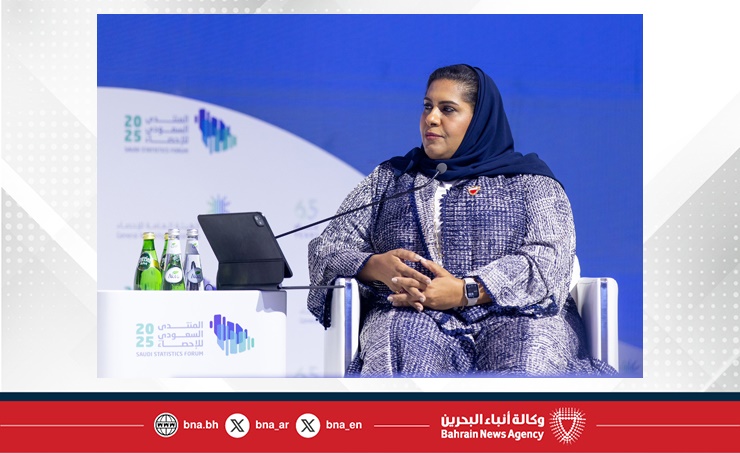iGA participates in Saudi Statistics Forum 2025

Riyadh, Apr. 29 (BNA): The Information and eGovernment Authority (iGA) participated in the Saudi Statistics Forum 2025, organised by the General Authority for Statistics in the Kingdom of Saudi Arabia on April 27 and 28 in Riyadh under the theme "Statistics for Sustainable Opportunities".
The forum marked 65 years of statistical work in Saudi Arabia and was held under the patronage of the Minister of Economy and Planning, Chairman of the General Authority for Statistics, with the participation of senior officials and experts in the statistical field locally and internationally.
Representing the iGA, Duaa Sultan Mohammed, Deputy Chief Executive of Statistics and Population Registry, took part in the third panel discussion titled "Innovation and Advancement in Statistical Methodologies". In her remarks, she congratulated Saudi Arabia on the anniversary of the General Authority for Statistics, commending its achievements in developing statistical work and valuing the forum’s role in reinforcing the Kingdom’s vision to promote data culture and the role of statistics in supporting sustainable development.
She highlighted that the forum serves as a strategic platform to exchange experiences and enhance Gulf cooperation in the statistical field, reflecting a shared commitment to providing decision-makers with accurate and reliable data. She noted that innovation in statistical work has become an essential tool in planning and evidence-based policymaking.
Sultan reviewed several key projects and initiatives launched by the Kingdom of Bahrain to enhance statistics using advanced technologies. She highlighted the importance of using remote sensing and satellite imagery to monitor environmental changes and improve natural resource management. She referred to the Agriculture Statistics 2010 project conducted through remote sensing, the Biophysical Vegetation Indicators 2020 project, and the 2023 Botanical Atlas, which used high-resolution satellite imagery and artificial intelligence technologies. She also mentioned the Urban Change Detection System and the Soil Mapping Project. She stressed the added value of Bahrain’s satellite "Al Munther," launched in March 2025, in supporting statistical analysis and advancing development projects.
She also discussed the impact of applying advanced statistical methods such as predictive analytics, machine learning, and time series analysis in improving decision-making. She explained that Bahrain has implemented these techniques in major national projects, including population census data analysis, the development of the labour market data platform, and the preparation of natural resource protection reports. She emphasised that these models support innovation and contribute to sustainability by providing accurate indicators to serve national planning.
Sultan also underlined the importance of statistical indicators in analysing trends and forecasting future developments. She presented Bahrain’s experience through economic and social performance indicators, tourism indicators, and the vital role of the Open Data Portal in promoting transparency and improving resource allocation efficiency.
She further reviewed Bahrain’s experience in using statistical analysis based on biometric and behavioural information through the enhanced eKey 2.0 system. The system helps detect duplicated and fraudulent records through biometric authentication and behavioural analysis technologies, boosting public trust in digital services and enhancing cybersecurity.
Sultan concluded by emphasising that investing in developing national capabilities in the field of statistics is a fundamental pillar for any country aspiring to achieve comprehensive and sustainable development. She commended Saudi Arabia’s leadership for its support of this vital and strategic sector.
The Saudi Statistics Forum featured five main sessions discussing the role of statistics in policymaking and decision-making, the development of methodologies and practices, innovation in statistical approaches, the role of the private sector, and the integration between statistical institutions and data users to enhance quality of life and achieve regional development goals.





